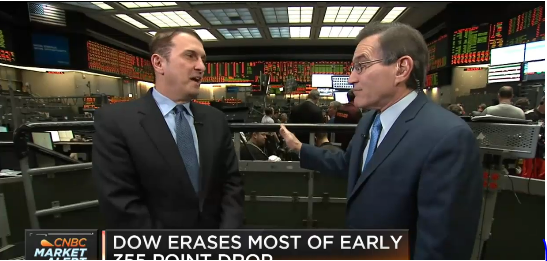Searching For Trump's Genius
I’m told, by people I respect, that I’m wrong. They say the U.S. President is a genius. I contend the opposite. They use unconvincing arguments like, “he’s a billionaire, he must be a genius,” and “look how he outsmarted all the other candidates and won the presidency.” It goes on and on.
However, I can’t help judging the man by how he acts and Robert Smith’s description of Trump in his book “Dead Bank Walking.” Smith, who was CEO of Security Pacific, met with Trump when Donald wanted to revitalize the neighborhood around the Ambassador Hotel in Los Angeles.
“Trump had a Clintonesque aura around him,” Smith wrote, “the effervescent divinity of a studied deal-maker, and a categorical ability to communicate and inspire the belief of others in his personal vision. He could no doubt have been an evangelist.”
Smith said no to Trump, but another division of the bank said yes to a $10 million loan. “Two years later we wrote the whole thing off,” Smith recalls.
Michael Lewis writes for Bloomberg, citing Michael Wolff’s book, “Fire and Fury.”
“Insulting Donald Trump’s intelligence was both the thing you could not do and the thing that everybody was guilty of,” Wolff writes. “Everyone, in his or her own way, struggled to express the baldly obvious fact that the president did not know enough, did not know what he didn’t know, and did not particularly care.” Secretary of State Rex Tillerson called Trump “a fucking moron.” Treasury Secretary Mnuchin and ex-Chief of Staff Reince Priebus preferred to describe Trump as “an idiot.” National Security Adviser H.R. McMaster called him a “dope.” Cohn called Trump “dumb as shit.”
Wolff’s book reinforced my view. However, Scott Adams writes in “Win Bigly: Persuasion in a World Where Facts Don't’ Matter” that I’m simply suffering from confirmation bias, an annoying habit humans have of interpreting information in a way that supports their existing world-view.
Adams, the creator of Dilbert, writes that Trump has “weapons-grade persuasion skills.” Going further he claims, “Trump is the most persuasive human I have ever observed.”
So what makes Adams’ opinion worth anything? He’s a trained hypnotist, he reminds the reader over and over. See, we’re all 2 dimensional idiots, while he and Trump are running circles around us in their 3 dimensional world. “Humans think they are rational,” writes Adams, “and they think they understand their reality. But they are wrong on both counts.”
Emotion drives our decision making and after-the-fact we cook up rationalizations to make our decisions seem rational, at least to us. “People don’t change opinions about emotional topics just because some information proved their opinion to be nonsense. Humans aren’t wired that way.”
All the nutty things Trump says, were and are, “hyperbole [serving] as weapons-grade persuasion,” wrote Adams who claims this is all skilled deal-making. Besides, Trump is a New Yorker and they have a different sense of humor. Most of us just don’t get the jokes and by-the-way, Trump “was bringing a flamethrower to a stick fight.”
“Master Persuaders move your energy to the topics that help them, independent of facts and reason,” Adams explains. That’s why we hear “wall, wall, wall” all the time. Forget facts and reason, Trump’s 40 percent base eats it up because it’s simple and a metaphor for what bugs them; Mexicans crossing the border. “A good general rule is that people are more influenced by visual persuasion, emotion, repetition, and simplicity than they are by details and facts,” writes Adams.
It’s often pointed out that Trump is not a conservative and certainly not libertarian. In the past he has tended to be a leftist. However, in the mind of the hypnotist, “Trump’s talent stack is so strong that I believe he could make almost any basket of policies sound good to the public.” Adams believes Trump could have won with Bernie Sanders’s socialist platform. Maybe he’ll try that in 2020.
So, did Trump win because he’s a genius? That doesn’t seem to be the case Adams makes. Instead, he writes, “People are irrational.” They use common sense and gut feelings to guide them and the fact is “your common sense and gut feelings are little more than magical thinking,” says Adams.
In “Fire and Fury” Michael Wolff wrote, “Almost all the professionals who were now set to join him [Trump] were coming face to face with the fact that it appeared he knew nothing.” “Whatever he knew he seemed to have learned an hour before--and that was mostly half-baked.”
Sam Nunberg was given the task of explaining the Constitution to candidate Trump. “I got as far as the Fourth Amendment before his finger is pulling down on his lip and eyes are rolling back in his head.” Details, details.
Steve Bannon, the Trump campaign guru, wrote Wolff, “was profoundly disorganized, seemingly on the spectrum given what captured his single-minded focus to the disregard of everything else.”
That description is amplified by Michael Lewis, who writes,
Steve Bannon reminded me of someone, but it’s not until I’m back in my hotel room that I realize who. He was a character from “The Big Short.” He saw the world differently from virtually everyone in his profession, and it led a lot of people to think that he was insane. But he was right and they were wrong, and the rest of the world has yet to come to terms with why.
What did Trump have besides the stamina to do five rallies a day during the campaign. Just what is the brilliance of a guy who had , as Lewis writes, “gone to the best schools, but he had somehow emerged from them with the grammar and diction of an uneducated person.”
Is there a secret sauce, or is it as Bannon says, “What was needed was a blunt force instrument, and Trump was a blunt force instrument.” Maybe it’s
“‘The vernacular,’ Bannon called Trump’s odd way of putting things. Other angry people, some of whom actually had been cheated by life, thrilled to its sound,” writes Lewis.
Trump was viewed as a candidate and now a President the likes of which the world has never seen. However, looking back on H.L. Mencken’s description of an American politician, perhaps he fits right in. “An ordinary American politician...the usual amalgam of knave and imbecile, so natural and normal to public life.”
We are all very lucky to witness barbaric politics, described by Mencken as “incredibly gross, Rabelaisian, vulgar, lewd, shocking and revolting.” He wrote, “I thank God that I am American, and thus admitted to such barbaric saturnalias. In a genuinely civilized country politics would be prohibited by law, and all politicians would be treated like pickpockets or street-walkers. But here they are honored and prosperous, and so they perform, and I enjoy the peculiar buffoonery that is to my taste.”
There’s no buffoonery, like Trump’s genius buffoonery of connecting with angry Americans.
Enjoy.






